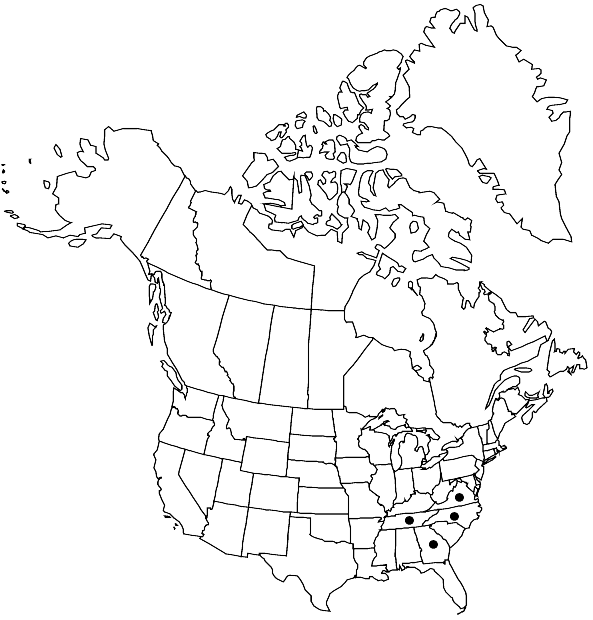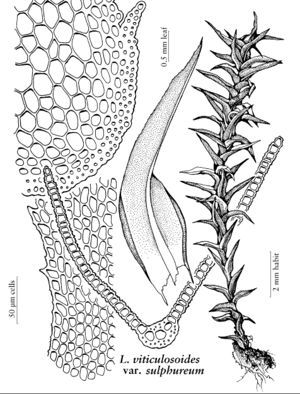Difference between revisions of "Leptodontium viticulosoides var. sulphureum"
Bryologist 86: 156. 1983,.
FNA>Volume Importer |
imported>Volume Importer |
||
| (3 intermediate revisions by 2 users not shown) | |||
| Line 9: | Line 9: | ||
|name=Trichostomum sulphureum | |name=Trichostomum sulphureum | ||
|authority=(Sullivant) E. Britton | |authority=(Sullivant) E. Britton | ||
| + | |rank=species | ||
|publication_title=Syn. Musc. Frond. | |publication_title=Syn. Musc. Frond. | ||
|publication_place=2: 626. 1851 | |publication_place=2: 626. 1851 | ||
| Line 15: | Line 16: | ||
|name=Leptodontium excelsum | |name=Leptodontium excelsum | ||
|authority=Sullivant | |authority=Sullivant | ||
| + | |rank=species | ||
}} {{Treatment/ID/Synonym | }} {{Treatment/ID/Synonym | ||
|name=Leptodontium sulphureum var. panamense | |name=Leptodontium sulphureum var. panamense | ||
|authority=Lorentz | |authority=Lorentz | ||
| + | |rank=variety | ||
}} {{Treatment/ID/Synonym | }} {{Treatment/ID/Synonym | ||
|name=Syrrhopodon excelsus | |name=Syrrhopodon excelsus | ||
| − | |authority= | + | |authority= |
| + | |rank=species | ||
}} {{Treatment/ID/Synonym | }} {{Treatment/ID/Synonym | ||
|name=Zygodon sullivantii | |name=Zygodon sullivantii | ||
| − | |authority= | + | |authority= |
| + | |rank=species | ||
}} | }} | ||
|hierarchy=Pottiaceae;Pottiaceae subfam. Barbuloideae;Leptodontium;Leptodontium viticulosoides;Leptodontium viticulosoides var. sulphureum | |hierarchy=Pottiaceae;Pottiaceae subfam. Barbuloideae;Leptodontium;Leptodontium viticulosoides;Leptodontium viticulosoides var. sulphureum | ||
| Line 38: | Line 43: | ||
|elevation=moderate to high elevations (1700-2100 m) | |elevation=moderate to high elevations (1700-2100 m) | ||
|distribution=Ga.;N.C.;Tenn.;Va.;Mexico;Central America;South America. | |distribution=Ga.;N.C.;Tenn.;Va.;Mexico;Central America;South America. | ||
| − | |discussion=<p>Only archegoniate plants of < | + | |discussion=<p>Only archegoniate plants of <i></i>var.<i> sulphureum</i> appear in the flora area. The description here is based solely on populations in that area; the variety has otherwise a large synonymy (see R. H. Zander 1972). The typical variety is widely distributed, but this one is known only from the New World. The southern Appalachian plants are flagellate (with distant leaves that become smaller distally) in comparison with most populations in Latin America but are matched by certain specimens from Mexico. The Appalachian plants are not autoicous as reported by H. A. Crum and L. E. Anderson (1981); perhaps galls, seen in some specimens, were mistaken for perigonia. The distribution of this taxon in the southern Appalachians is associated with the spread of the balsam woolly aphid; damaged, defoliating bark is preferentially colonized by this moss. The priority of the epithet “sulphureum” at the rank of variety as an autonym is due to the valid publication of the Lorentz name L. sulphureum var. panamense.</p> |
|tables= | |tables= | ||
|references= | |references= | ||
| Line 47: | Line 52: | ||
-->{{#Taxon: | -->{{#Taxon: | ||
name=Leptodontium viticulosoides var. sulphureum | name=Leptodontium viticulosoides var. sulphureum | ||
| − | |||
|authority=(Müller Hal.) R. H. Zander | |authority=(Müller Hal.) R. H. Zander | ||
|rank=variety | |rank=variety | ||
| Line 61: | Line 65: | ||
|publication year= | |publication year= | ||
|special status= | |special status= | ||
| − | |source xml=https:// | + | |source xml=https://bitbucket.org/aafc-mbb/fna-data-curation/src/2e0870ddd59836b60bcf96646a41e87ea5a5943a/coarse_grained_fna_xml/V27/V27_827.xml |
|subfamily=Pottiaceae subfam. Barbuloideae | |subfamily=Pottiaceae subfam. Barbuloideae | ||
|genus=Leptodontium | |genus=Leptodontium | ||
Latest revision as of 22:28, 5 November 2020
Stems to 5 cm. Leaves 2.0–2.5 mm, long-lanceolate, not bordered by differentiated cells; apex narrowly acute; costa percurrent, abaxially smooth; distal laminal cells 8–11 µm wide, 1:1 or medially longitudinally elongate to 2:1, walls thickened throughout the distal portion of the leaf, lumens irregularly rounded, proximal cell walls thickened and porose above but thin-walled below.
Habitat: Mainly on branches of balsam fir (Abies balsamea), also Sorbus
Elevation: moderate to high elevations (1700-2100 m)
Distribution

Ga., N.C., Tenn., Va., Mexico, Central America, South America.
Discussion
Only archegoniate plants of var. sulphureum appear in the flora area. The description here is based solely on populations in that area; the variety has otherwise a large synonymy (see R. H. Zander 1972). The typical variety is widely distributed, but this one is known only from the New World. The southern Appalachian plants are flagellate (with distant leaves that become smaller distally) in comparison with most populations in Latin America but are matched by certain specimens from Mexico. The Appalachian plants are not autoicous as reported by H. A. Crum and L. E. Anderson (1981); perhaps galls, seen in some specimens, were mistaken for perigonia. The distribution of this taxon in the southern Appalachians is associated with the spread of the balsam woolly aphid; damaged, defoliating bark is preferentially colonized by this moss. The priority of the epithet “sulphureum” at the rank of variety as an autonym is due to the valid publication of the Lorentz name L. sulphureum var. panamense.
Selected References
None.
